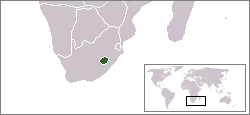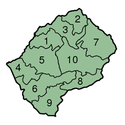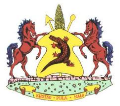Lesotho
|
|
The Kingdom of Lesotho ('Muso oa Lesotho) is a country in southern Africa. It is an enclave-nation and is entirely surrounded by the Republic of South Africa. Formerly Basutoland, it is a member of the British Commonwealth. The name Le-sotho roughly translates into "the land of the people who speak Sotho".
| |||||
| National motto: Khotso, Pula, Nala; Peace, Rain, Prosperity</font> | |||||

| |||||
| Languages | Sesotho (southern Sotho), English (official), Zulu, Xhosa | ||||
| Capital and largest city | Maseru | ||||
| Capital's coordinates | Template:Coor dm | ||||
| Monarch | HM The King of Lesotho, Letsie III | ||||
| Prime Minister | Pakalitha Mosisili | ||||
| Area - Total - % water | Ranked 137th 30,355 km² Negligible | ||||
| Population - Total (2004) - Density | Ranked 143rd 1,861,959 61.3/km² | ||||
| GDP (PPP) - Total (Year)
| Ranked 147th $5.106 billion $2,700 | ||||
| Currency | Loti (L) | ||||
| Time zone | UTC +2 | ||||
| Establishment | 1824 | ||||
| National anthem | Lesotho Fatse La Bontat'a Rona | ||||
| Internet TLD | .ls | ||||
| Calling Code | 266 | ||||
| Contents |
History
Main article: History of Lesotho
Lesotho gained independence from the United Kingdom on October 4, 1966. In January 1970 the ruling Basotho National Party (BNP) appeared set to lose the first post-independence general elections when Prime Minister Leabua Jonathan annulled the election. He refused to cede power to the Basotho Congress Party (BCP) and imprisoned its leadership.
The BNP ruled by decree until January 1986 when a military coup forced them out of office. The Military Council that came into power granted executive powers to King Moshoeshoe II, who was until then a ceremonial monarch. In 1987, however, the King was forced into exile after a falling out with the army. His son was installed as King Letsie III.
The chairman of the military junta, Major General Justin Metsing Lekhanya, was ousted in 1991 and then replaced by Major General Elias Phisoana Ramaema, who handed over power to a democratically elected government of the BCP in 1993. Moshoeshoe II returned from exile in 1992 as an ordinary citizen. After the return to democratic government, King Letsie III tried unsuccessfully to persuade the BCP government to reinstate his father (Moshoeshoe II) as head of state. In August 1994, Letsie III staged a coup which was backed by the military and deposed the BCP government. The new government did not receive full international recognition. Member states of the Southern African Development Community (SADC) engaged in negotiations aimed at the reinstatement of the BCP government. One of the conditions put forward by the King for the return of the BCP government was that his father should be re-installed as head of state. After protracted negotiations, the BCP government was reinstated and the King abdicated in favor of his father in 1995, but Moshoeshoe II died in a car accident in 1996 and was again succeeded by his son, Letsie III. The ruling BCP split over leadership disputes in 1997.
Prime Minister Ntsu Mokhehle formed a new party, the Lesotho Congress for Democracy (LCD), and was followed by a majority of Members of Parliament, which enabled him to form a new government. The LCD won the general elections in 1998 under the leadership of Pakalitha Mosisili, who had succeeded Mokhehle as party leader. Despite the elections being pronounced free and fair by local and international observers and a subsequent special commission appointed by SADC, the opposition political parties rejected the results.
Opposition protests in the country intensified, culminating in a violent demonstration outside the royal palace in August 1998. When junior members of the armed services mutinied in September, the government requested a SADC task force to intervene to prevent a coup and restore stability. A military group of South African and Botswana troops entered the country in September, put down the mutiny, and withdrew in May 1999. Looting, casualties, and widespread destruction of property followed.
An Interim Political Authority (IPA), charged with reviewing the electoral structure in the country, was created in December 1998. The IPA devised a proportional electoral system to ensure that there be opposition in the National Assembly. The new system retained the existing 80 elected Assembly seats, but added 40 seats to be filled on a proportional basis. Elections were held under this new system in May 2002, and the LCD won again. For the first time, however, opposition political parties won significant numbers of seats. Nine opposition parties now hold all 40 of the proportional seats, with the BNP having the largest share (21). The LCD has 79 of the 80 constituency-based seats. Although its elected members participate in the National Assembly, the BNP has launched several legal challenges to the elections, including a recount; none has been successful.
Politics
Main article: Politics of Lesotho
The Lesotho Government is a constitutional monarchy. The Prime Minister, Pakalitha Mosisili, is head of government and has executive authority. The King serves a largely ceremonial function; he no longer possesses any executive authority and is proscribed from actively participating in political initiatives.
The Lesotho Congress for Democracy (LCD) controls a majority in the National Assembly (the lower house of parliament), with the Basotho National Party (BNP), Lesotho Peoples Congress, and the National Independent Party among the 9 opposition parties represented. The upper house of parliament, called the Senate, is composed of 22 principal chiefs whose membership is hereditary, and 11 appointees of the King, acting on the advice of the prime minister. The constitution provides for an independent judicial system. The judiciary is made up of the Court of Appeal, the High Court, Magistrate's Courts, and traditional courts that exist predominately in rural areas. All but one of the Justices on the Court of Appeal are South African jurists. There is no trial by jury; rather, judges make rulings alone, or, in the case of criminal trials, with two other judges as observers. The constitution also protects basic civil liberties, including freedom of speech, association, and the press; freedom of peaceful assembly; and freedom of religion.
Districts
Main Article: Districts of Lesotho
For administrative purposes, Lesotho is divided into 10 districts, each headed by a district secretary.
<td>
| 
|
Geography
Lt-map.png
Main article: Geography of Lesotho
The most notable geographic fact about Lesotho, apart from its status as an enclave, is that it is the only independent state in the world that lies entirely above 1,000 metres in elevation. Its lowest point is 1,400 m, and over 80% of the country lies above 1,800 m.
Economy
Main article: Economy of Lesotho
Lesotho's economy is based on exports of water and electricity sold to South Africa, manufacturing, agriculture, livestock, and to some extent the earnings of laborers employed in South Africa. Lesotho also exports diamonds, wool, and mohair. Lesotho is geographically surrounded by South Africa and economically integrated with it as well. The majority of households subsist on farming or migrant labor, primarily miners in South Africa for 3 to 9 months. The western lowlands form the main agricultural zone. Almost 50% of the population earns some income through crop cultivation or animal husbandry, with over half the country's income coming from the agricultural sector.
Water is Lesotho's only significant natural resource. It is being exploited through the 30-year, multi-billion-dollar Lesotho Highlands Water Project (LHWP), which was initiated in 1986. The LHWP is designed to capture, store, and transfer water from the Orange River system and send it to South Africa's Free State and greater Johannesburg area, which features a large concentration of South African industry, population, and agriculture. Completion of the first phase of the project has made Lesotho almost completely self-sufficient in the production of electricity and generated approximately $24 million annually from the sale of electricity and water to South Africa. The World Bank, African Development Bank, European Investment Bank, and many other bilateral donors financed the project. Lesotho has taken advantage of the African Growth and Opportunity Act (AGOA) to become the largest exporter of garments to the U.S. from sub-Saharan Africa. Exports totaled over $320 million in 2002. Employment reached over 50,000, marking the first time that manufacturing sector workers outnumbered government employees. Asian investors own most factories.
Lesotho has received economic aid from a variety of sources, including the United States, the World Bank, Ireland, the United Kingdom, the European Union, and Germany.
Lesotho has nearly 6,000 kilometers of unpaved and modern all-weather roads. There is a short rail line (freight) linking Lesotho with South Africa that is totally owned and operated by South Africa. Lesotho is a member of the Southern African Customs Union (SACU), in which tariffs have been eliminated on the trade of goods between other member countries Botswana, Namibia, South Africa, and Swaziland. Lesotho, Swaziland, Namibia, and South Africa also form a common currency and exchange control area known as the Common Monetary Area (CMA). The South African rand can be used interchangeably with the loti, the Lesotho currency (plural: maloti). One hundred lisente equal one loti. The loti is at par with the rand.
HIV/AIDS
According to recent estimates, the HIV/AIDS prevalence rate in Lesotho is about 29%, one of the highest rates in the world. The United Nations estimates that this rate will rise to 36% within the next 15 years, resulting in a sharp drop in life expectancy. According to the Lesotho Bureau of Statistics, in 2001 life expectancy was estimated at 48 for men and 56 for women. Recent statistics estimate that life expectancy has fallen to an average of about 37 years.
The government of Lesotho was initially slow to recognize the scale of the HIV/AIDS crisis, and its efforts to date in combating the spread of the disease have met with limited success. In 1999, the government finalized its Strategic Plan on HIV/AIDS, a diagram for addressing the education, prevention, counseling, and treatment needs of the populace. In late 2003, the government announced that it was forming a new National AIDS Commission to coordinate society-wide anti-AIDS activities. Also in 2003 the Government of Lesotho hosted a SADC Extraordinary Summit on HIV/AIDS.
Short of trained personnel and medical supplies, Lesotho is severely afflicted by HIV/Aids. Many children have lost parents. Traditionally lavish funerals leave survivors with another burden. Throughout the trauma of Aids and illness the Basotho remain remarkably faithful and believing.
Defense
The security force is composed of the Lesotho Defense Force (LDF--estimated 3,500 personnel) and the Lesotho Mounted Police Service (LMPS). The LDF consists of an army, an air wing, and a paramilitary wing. The LDF answers to the Prime Minister (who is the Minister of Defense and National Security and also the Minister of Public Service), while the Lesotho Mounted Police Service reports to the Minister of Home Affairs. There also is a National Security Service (NSS), Intelligence, which is directly accountable to the Prime Minister. Relations between the police and the army have occasionally been tense, and in 1997 the army was called upon to put down a serious police mutiny.
Foreign relations
Lesotho's geographic location makes it extremely vulnerable to political and economic developments in South Africa. It is a member of many regional economic organizations including the Southern African Development Community (SADC) and the Southern African Customs Union (SACU). Lesotho also is active in the United Nations, the African Union, the Nonaligned Movement, the Commonwealth, and many other international organizations. In addition to the United States, South Africa, China, the United Kingdom, Libya, Ireland (Consulate General), and the European Union, all currently retain resident diplomatic missions in Lesotho. The United Nations is represented by a resident mission as well, including UNDP, UNICEF, WHO, FAO, WFP, and UNAIDS.
Lesotho has historically maintained generally close ties with the United States, the United Kingdom, Germany, and other Western states. Although Lesotho decided in 1990 to break relations with the People's Republic of China (P.R.C.) and reestablish relations with Taiwan, it has since restored ties with the P.R.C. Lesotho also recognized Palestine as a state, was a strong public supporter of the end of apartheid in South Africa, and granted a number of South African refugees political asylum during the apartheid era.
Demographics
Main article: Demographics of Lesotho
More than 99% of Lesotho's population is ethnically Basotho; other ethnic groups include Europeans and Asians. The country's population is 80% Christian, the majority of whom are Roman Catholic. Other religions are Islam, Hindu, and indigenous beliefs. Sesotho and English are official languages, and other languages spoken include Zulu and Xhosa.
Culture
Main article: Culture of Lesotho
Miscellaneous topics
- Communications in Lesotho
- Transportation in Lesotho
- Military of Lesotho
- Foreign relations of Lesotho
- National University of Lesotho
- National University of Lesotho International School
External Links
Template:Portal Template:Commonscat Template:Wiktionary
Government
- Lesotho Government Online (http://www.lesotho.gov.ls/) official government site
News
- allAfrica - Lesotho (http://allafrica.com/lesotho/) news headline links
Overviews
- BBC News - Country Profile: Lesotho (http://news.bbc.co.uk/1/hi/world/africa/country_profiles/1063291.stm)
- CIA World Factbook - Lesotho (http://www.cia.gov/cia/publications/factbook/geos/lt.html)
Directories
- LookSmart - Lesotho (http://search.looksmart.com/p/browse/us1/us317836/us317916/us559898/us559899/us10065675/us559928/) directory category
- Open Directory Project - Lesotho (http://dmoz.org/Regional/Africa/Lesotho/) directory category
- Stanford University - Africa South of the Sahara: Lesotho (http://www-sul.stanford.edu/depts/ssrg/africa/leso.html) directory category
- The Index on Africa - Lesotho (http://www.afrika.no/index/Countries/Lesotho/) directory category
- University of Pennsylvania - African Studies Center: Lesotho (http://www.sas.upenn.edu/African_Studies/Country_Specific/Lesotho.html) directory category
- Yahoo! - Lesotho (http://dir.yahoo.com/Regional/Countries/Lesotho/) directory category
Tourism
| Countries in Africa | ||
|
Algeria | Angola | Benin | Botswana | Burkina Faso | Burundi | Cameroon | Cape Verde | Central African Republic | Chad | Comoros | Democratic Republic of the Congo | Republic of the Congo | Côte d'Ivoire | Djibouti | Egypt | Equatorial Guinea | Eritrea | Ethiopia | Gabon | The Gambia | Ghana | Guinea | Guinea-Bissau | Kenya | Lesotho | Liberia | Libya | Madagascar | Malawi | Mali | Mauritania | Mauritius | Morocco | Mozambique | Namibia | Niger | Nigeria | Rwanda | São Tomé and Príncipe | Senegal | Seychelles | Sierra Leone | Somalia | Somaliland | South Africa | Sudan | Swaziland | Tanzania | Togo | Tunisia | Uganda | Zambia | Zimbabwe | Western Sahara | ||
| Dependencies: Canary Islands | Ceuta and Melilla | Madeira Islands | Mayotte | Réunion | Saint Helena and dependencies | ||
ar:ليسوتو ca:Lesotho de:Lesotho et:Lesotho es:Lesoto eo:Lesoto fr:Lesotho gd:Lesotho ko:레소토 id:Lesotho io:Lesoto it:Lesotho he:לסוטו la:Lesothum lv:Lesoto lt:Lesotas ms:Lesotho zh-min-nan:Lesotho nl:Lesotho nds:Lesotho ja:レソト nn:Lesotho no:Lesotho pl:Lesotho pt:Lesoto ro:Lesotho ru:Лесото sk:Lesotho sl:Lesoto fi:Lesotho sv:Lesotho tr:Lesoto uk:Лесото zh:莱索托


